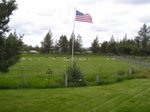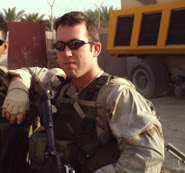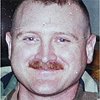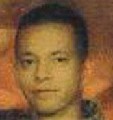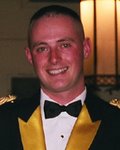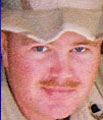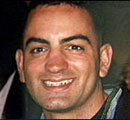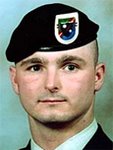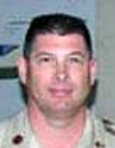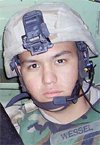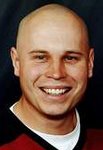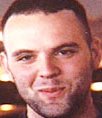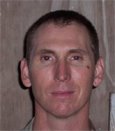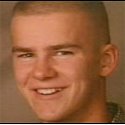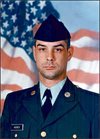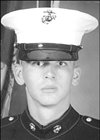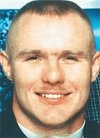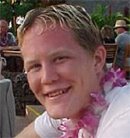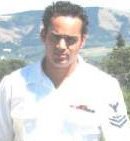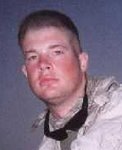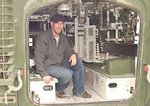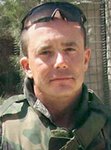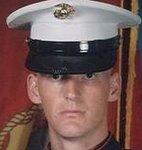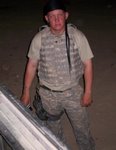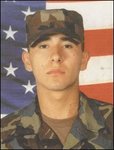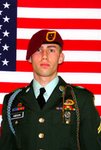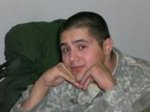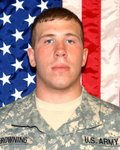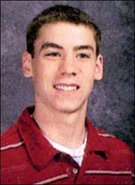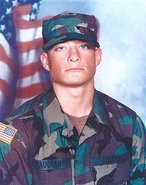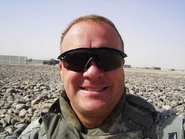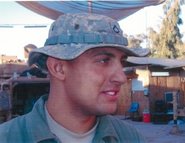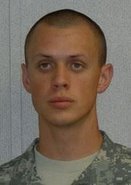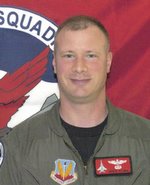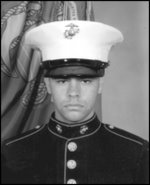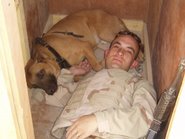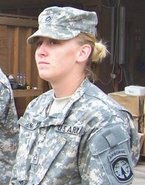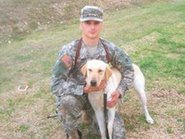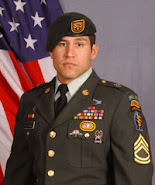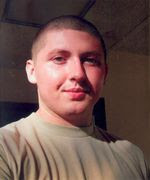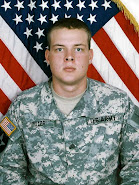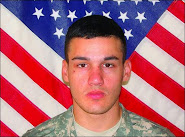 Army Staff Sgt. John Okumu, a Kenya native, speaks with teenagers in northern Uganda, where he is among the first U.S. soldiers setting up operations for Natural Fire 10, an annual multinational exercise, Oct. 13, 2009. Okumu speaks the teens' native language, Luo. U.S. Army photo by Lt. Col. David Konop
Army Staff Sgt. John Okumu, a Kenya native, speaks with teenagers in northern Uganda, where he is among the first U.S. soldiers setting up operations for Natural Fire 10, an annual multinational exercise, Oct. 13, 2009. Okumu speaks the teens' native language, Luo. U.S. Army photo by Lt. Col. David Konop  U.S. Army Soldier inspires African teens in Uganda
U.S. Army Soldier inspires African teens in Uganda
By Lt. Col. David Konop
KITGUM, Uganda – When Staff Sgt. John Okumu joined the U.S. Army nearly five years ago, he never dreamed he would one day deploy to Africa, the continent he once called home.
Okumu, who hails originally from Kenya, is among the first U.S. Soldiers setting up operations for Natural Fire 10, a multi-national partnership exercise held this month in Uganda.
During a recent visit to Kitgum High school, Okumu, a logistics NCO, found himself surrounded by curious teens eager to learn more about the American sergeant who spoke their language.
Okumu,35, welcomed such an ambush, responding to a barrage of questions from the uniformed high school students. Within minutes, a small circle of a dozen students grew into a crowd of 60 or more.
“How can I go to the United States and become a soldier like you,” one teen asked.
What began as an impromptu discussion grew into a huddle of dozens, hanging on Okumu’s every word. He told them how important it was for them to do well in school and reach for their goals.
“Education in the key,” Okumu said. “Everyone has a talent. You just need to find out what yours is.”
The students paid close attention and asked many questions. At one point, they broke into laughter after one student asked a question the others thought was silly. Okumu was quick to jump in, telling the students never to be afraid to learn by asking.
“There’s no such thing as a stupid question, except to the question that’s never asked,” Okumu said.
The conversation went on in English, which the teens learn in their classes. But they were initially drawn to Okumu when they heard him speak Luo - the language spoken in northern Uganda which is what Okumu learned as a child in Kenya. He moved to Missouri in 2000.
Okumu is assigned to a group of 21st Theater Sustainment Command Soldiers tasked with constructing a base camp in Kitgum and providing logistical support for Natural Fire 10. In the coming days, hundreds of
Soldiers from Burundi, Kenya, Rwanda, Tanzania and Uganda will join U.S. troops for the 10-day exercise, which has been held in East Africa every two years for the past decade.
This year, Natural Fire 10 offers an opportunity for East African Community (EAC) Partner Nations and the U.S. military to work together on a humanitarian assistance mission. The exercise takes place in three locations; Entebbe, Kampala and Kitgum.
In Kampala and Entebbe, military and civilian leaders from the U.S. and five Africa partner nations will take part in a table top exercise that simulates a mock natural disaster requiring international support and coordination. In Kitgum, U.S. Army Africa and partner nations will undertake a field training exercise geared toward enhancing their abilities to work together and increase capacity on tasks that support disaster relief and humanitarian assistance.
Together, they will practice tasks such as convoy operations, crowd control, weapons handling and vehicle checkpoints.
Also in Kitgum, U.S. troops and East African partners will provide medical, dental and engineering support to local communities. Engineer projects will be conducted at the Kitgum High School, Mucwini Primary School and Kitgum Government Hospital – where students anxiously anticipate more interaction with Okumu and his fellow Americans.
And Okumu looks forward to seeing them again soon. During their recent chat, Okumu made sure they understood the importance of education to their future success.
“Good grades and test scores may qualify you for scholarships to the U.S.,” Okumu said. “Do your best.”
Cleared for public release.
Photo by Lt. Col. David Konop, U.S. Army Africa
To learn more about U.S. Army Africa visit our official website at
www.usaraf.army.milIt is easy to forget that we have a great many troops in Africa. And, they are doing good things.
























